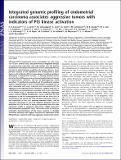Integrated genomic profiling of endometrial carcinoma associates aggressive tumors with indicators of PI3 kinase activation
Author(s)
Salvesen, H. B.; Carter, Scott L.; Mannelqvist, M.; Dutt, Amit; Getz, Gad; Stefansson, I. M.; Raeder, M. B.; Sos, M. L.; Engelsen, I. B.; Trovik, J.; Wik, E.; Greulich, Heidi; Bo, T. H.; Jonassen, I.; Thomas, R. K.; Zander, T.; Garraway, Levi A.; Oyan, A. M.; Sellers, W. R.; Kalland, K. H.; Meyerson, Matthew L.; Akslen, L. A.; Beroukhim, Rameen; ... Show more Show less
DownloadSalvesen-2009-Integrated genomic p.pdf (681.5Kb)
PUBLISHER_POLICY
Publisher Policy
Article is made available in accordance with the publisher's policy and may be subject to US copyright law. Please refer to the publisher's site for terms of use.
Terms of use
Metadata
Show full item recordAbstract
Although 75% of endometrial cancers are treated at an early stage, 15% to 20% of these recur. We performed an integrated analysis of genome-wide expression and copy-number data for primary endometrial carcinomas with extensive clinical and histopathological data to detect features predictive of recurrent disease. Unsupervised analysis of the expression data distinguished 2 major clusters with strikingly different phenotypes, including significant differences in disease-free survival. To identify possible mechanisms for these differences, we performed a global genomic survey of amplifications, deletions, and loss of heterozygosity, which identified 11 significantly amplified and 13 significantly deleted regions. Amplifications of 3q26.32 harboring the oncogene PIK3CA were associated with poor prognosis and segregated with the aggressive transcriptional cluster. Moreover, samples with PIK3CA amplification carried signatures associated with in vitro activation of PI3 kinase (PI3K), a signature that was shared by aggressive tumors without PIK3CA amplification. Tumors with loss of PTEN expression or PIK3CA overexpression that did not have PIK3CA amplification also shared the PI3K activation signature, high protein expression of the PI3K pathway member STMN1, and an aggressive phenotype in test and validation datasets. However, mutations of PTEN or PIK3CA were not associated with the same expression profile or aggressive phenotype. STMN1 expression had independent prognostic value. The results affirm the utility of systematic characterization of the cancer genome in clinically annotated specimens and suggest the particular importance of the PI3K pathway in patients who have aggressive endometrial cancer.
Date issued
2009-03Department
Broad Institute of MIT and Harvard; Harvard University--MIT Division of Health Sciences and TechnologyJournal
Proceedings of the National Academy of Sciences of the United States of America
Publisher
National Academy of Sciences
Citation
Salvesen, H. B et al. “Integrated genomic profiling of endometrial carcinoma associates aggressive tumors with indicators of PI3 kinase activation.” Proceedings of the National Academy of Sciences 106.12 (2009): 4834-4839.
Version: Final published version
ISSN
0027-8424